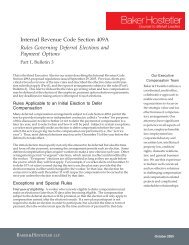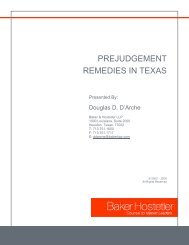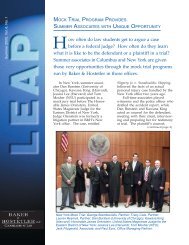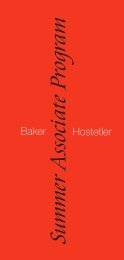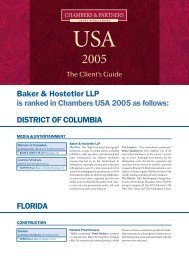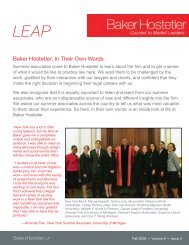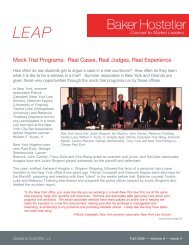The Charity Care Requirement for Hospital Property Tax Exemptions
The Charity Care Requirement for Hospital Property Tax Exemptions
The Charity Care Requirement for Hospital Property Tax Exemptions
You also want an ePaper? Increase the reach of your titles
YUMPU automatically turns print PDFs into web optimized ePapers that Google loves.
care that would be sufficient. Moreover, according to Provena and the Illinois <strong>Hospital</strong><br />
Association as amicus, the amount of charity care depends on the economic status of the<br />
patients that happen to come to the hospital.<br />
<strong>The</strong> appellate court concluded that the quantity of charity care was important and<br />
that the 0.7% charity care found by the Director was insufficient to qualify <strong>for</strong> the<br />
charitable exemption. <strong>The</strong> court refused to overturn the inference by the Director that the<br />
“small” amount of charity care showed that Provena had not been dispensing charity care<br />
to all who needed it. While Provena had a charity care policy based on the income<br />
thresholds <strong>for</strong> the patients, the Director criticized the policy because the policy was said<br />
to ignore the size of the bill <strong>for</strong> medical services while focusing solely on the income<br />
status of the patient. Thus, the policy failed to distinguish between a patient with a<br />
$1,000 bill and a second patient with a $100,000 bill.<br />
<strong>The</strong> appellate court agreed with the Director that the use of collection agencies,<br />
<strong>for</strong> patients who qualified <strong>for</strong> charity care, presented a barrier to claiming charitable<br />
exemption. <strong>The</strong> court seemed concerned that the use of collection agencies <strong>for</strong> charity<br />
patients would deter those patients by the “prospects of crushing financial liability.”<br />
<strong>The</strong> appellate court then addressed the issue of determining how to calculate the<br />
amount of charity care in the case of the hospital receiving only partial payment <strong>for</strong> its<br />
services. <strong>The</strong> first question must be whether the reduction is measured by reference to<br />
(1) the patient charges made by the hospital or (2) its costs. <strong>The</strong> measure of donated care<br />
would of course be much greater if comparing the amount billed to the announced<br />
charges <strong>for</strong> that service in contrast to comparing the amount billed to the costs incurred<br />
by the hospital. <strong>The</strong> court chose to employ cost as the comparison. Using costs, the<br />
court then considered the measure to be used: either marginal costs <strong>for</strong> an additional<br />
patient or the average costs. <strong>The</strong> marginal costs <strong>for</strong> an additional patient may be small<br />
but Provena argued, and the court agreed, that the average cost is a better indicator than<br />
marginal costs.<br />
Using costs to compare, the appellate court expressed concern that the discounted<br />
charges were not charity care because Provena continued to make a profit albeit at a<br />
lower margin. <strong>The</strong> court referenced the Director’s argument as follows:<br />
In 2002, pursuant to its charity care policy, [Provena]<br />
treated some patients <strong>for</strong> free and discounted its bills <strong>for</strong><br />
other patients. Apparently, in calculating the amount of its<br />
charity care, [Provena] used the average cost of the<br />
discounted portions of the bills. <strong>The</strong> Director stated:<br />
"<strong>The</strong> applicant has asserted in several different<br />
contexts that the cost of waiving charges pursuant to<br />
its charity care policy in 2002 was $831,724 …<br />
while the revenue it waived amounted to<br />
$1,758,940 …. To obtain the cost figure, the<br />
6



